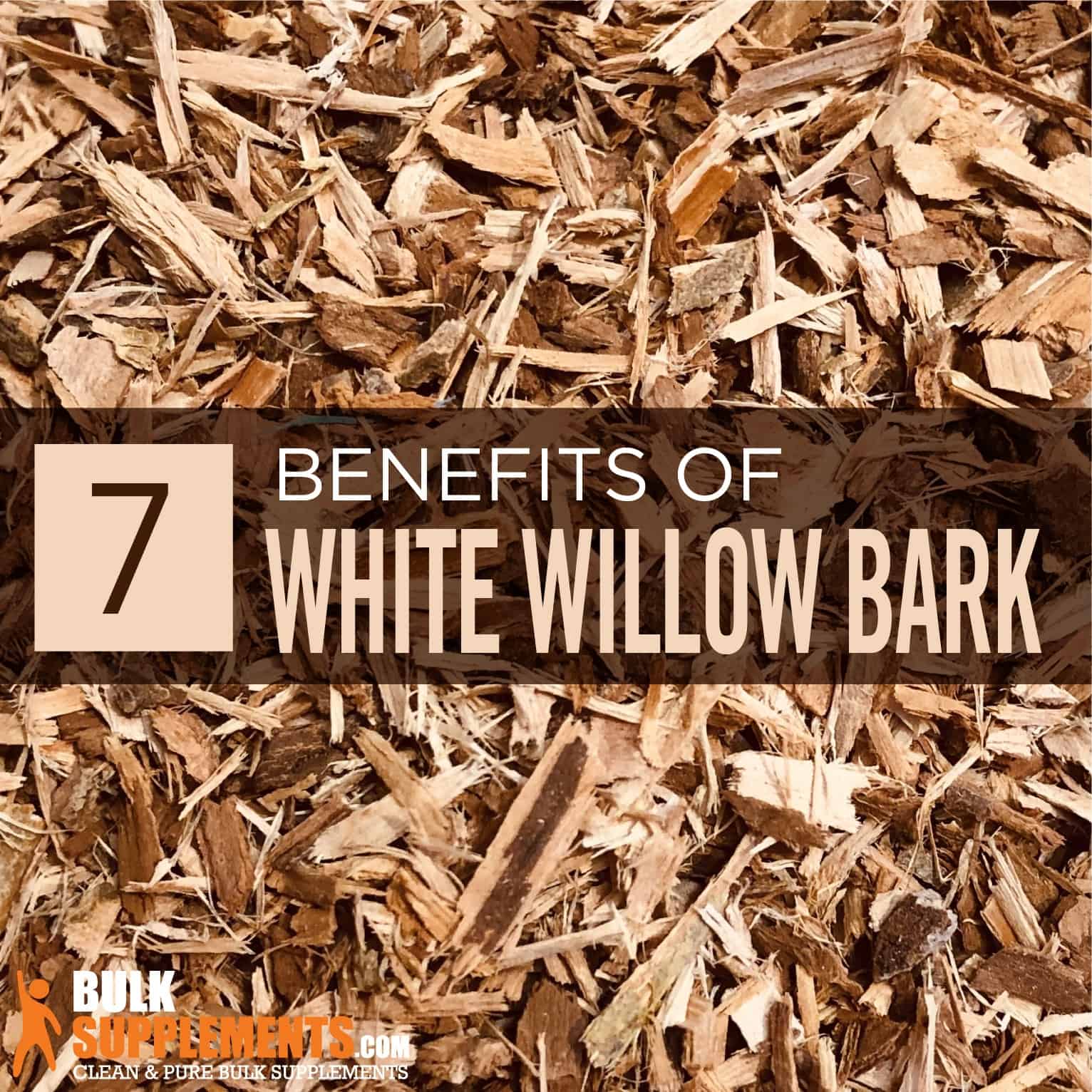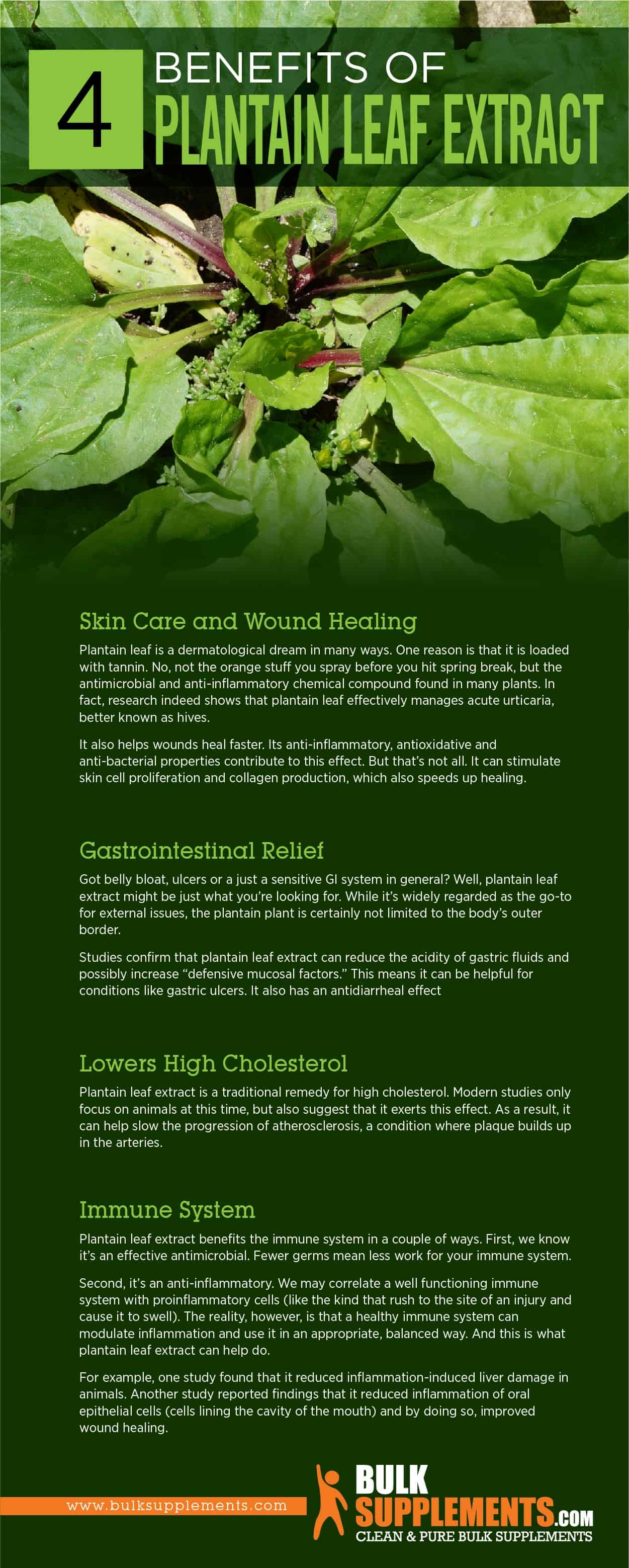Plantain Leaf Extract: Benefits, Side Effects & Dosage

Plantain Leaf Extract
What is Plantain Leaf Extract?
If your only idea of plantains and their broad, shady leaves involves a vision of yourself reclining lazily on a cozy island hammock under the sun, perhaps that alone gives them therapeutic value. But plantain leaves do much more than provide a backdrop for your daydreams.
Plantain leaf extract is not the same as the yummy, starchy staple found in many tropical countries. It doesn’t make an amazing snack chip or addictive side dish at Bahama Breeze restaurants. Instead, we’re talking about the benefits of plantain leaves and their extracts.
Okay, history buffs, did you know that the long and fascinating medicinal history of the plantain plant started in antiquity? It gained the folkloric name of “Green Bandage” based on its use as a poultice to soothe skin irritations, offer a form of first aid and expedite the healing of bacterial infections.
Geographically, the plantain leaf has been racking up the frequent flier miles. It appears on nearly every continent due to its ability to grow in almost any type of soil and climate. The plantain is actually one of the world’s most common wild vegetables. Hundreds of species of plantain exist, including two that are well studied for their therapeutic effects — Plantago major and Plantago asiatica.
Plantain leaf extract is heralded as a traditional treatment for skin ailments, sunburns, pink eye and dandruff. Coughs, fevers, bleeding, insect bites, burns and insomnia also top the list of ailments for which it’s used.
Modern research shows it reduces inflammation, aids wound healing, kills bacteria and viruses and relieves gastrointestinal distress. It’s also an excellent antioxidant.
Plantain Leaf Extract Benefits
What gives this supplement its superpowers? Compounds like flavonoids, alkaloids, terpenoids, phenolic acid derivatives, polysaccharides and vitamins, to name a few. As a result, plantain leaves are:
- Antibacterial and antiviral
- Anti-inflammatory
- Antioxidative
- Immune-modulating
This gives them many therapeutic applications, specifically for skin, the gastrointestinal tract and the immune system.
Skin Care and Wound Healing
Plantain leaf is a dermatological dream in many ways. One reason is that it is loaded with tannin. No, not the orange stuff you spray before you hit spring break, but the antimicrobial and anti-inflammatory chemical compound found in many plants. In fact, research indeed shows that plantain leaf effectively manages acute urticaria, better known as hives.
It also helps wounds heal faster. Its anti-inflammatory, antioxidative and anti-bacterial properties contribute to this effect. But that’s not all. It can stimulate skin cell proliferation and collagen production, which also speeds up healing.
While there isn’t much scientific evidence to back this up yet, plantain leaf is a classic and well-regarded natural remedy for dandruff. A google search will give you countless ways to add it to your hair care regimen.
Gastrointestinal Relief
Got belly bloat, ulcers or a just a sensitive GI system in general? Well, plantain leaf extract might be just what you’re looking for. While it’s widely regarded as the go-to for external issues, the plantain plant is certainly not limited to the body’s outer border.
Studies confirm that plantain leaf extract can reduce the acidity of gastric fluids and possibly increase “defensive mucosal factors.” This means it can be helpful for conditions like gastric ulcers. It also has an antidiarrheal effect.
Lowers High Cholesterol
Plantain leaf extract is a traditional remedy for high cholesterol. Modern studies only focus on animals at this time, but also suggest that it exerts this effect. As a result, it can help slow the progression of atherosclerosis, a condition where plaque builds up in the arteries.
Immune System
Plantain leaf extract benefits the immune system in a couple of ways. First, we know it’s an effective antimicrobial. Fewer germs mean less work for your immune system.
SEE ALSO

White Willow Bark Extract: Benefits, Side Effects & Dosage
Second, it’s an anti-inflammatory. We may correlate a well functioning immune system with proinflammatory cells (like the kind that rush to the site of an injury and cause it to swell). The reality, however, is that a healthy immune system can modulate inflammation and use it in an appropriate, balanced way. And this is what plantain leaf extract can help do.
For example, one study found that it reduced inflammation-induced liver damage in animals. Another study reported findings that it reduced inflammation of oral epithelial cells (cells lining the cavity of the mouth) and by doing so, improved wound healing.
Other Benefits and Uses
Researchers are investigating the anti-anxiety potential of plantain leaf extract. In a small animal study, it helped chemically-stimulated rats sleep longer, suggesting a sedative effect.

Plantain Leaf Extract Dosage and Side Effects
As a dietary supplement, take 800 mg (heavy 1/3 tsp) of plantain leaf extract once daily with meals, or as directed by a physician. Of course, one should not consider this supplement as a substitute for professional medical advice. Be sure to talk to a doctor before adding this supplement to your regimen.
Certain people should also refrain from plantain leaf usage, including pregnant/nursing women and those allergic to it. Anyone with diabetes or problems maintaining stable blood sugar should use with caution.
Plantain leaf extract may also interact with carbamazepine, lithium, warfarin, iron supplements, minerals and vitamin B12 supplements.
The Bottom Line
While plantain leaf extract is not an absolute fix or lone magical potion to cure all your ills, it is definitely worth considering when seeking relief from some bacterial, dermatological and gastrointestinal symptoms. Widely available and used safely since antiquity, it reduces inflammation, helps wounds heal, soothes the stomach and might even help get rid of dandruff.



